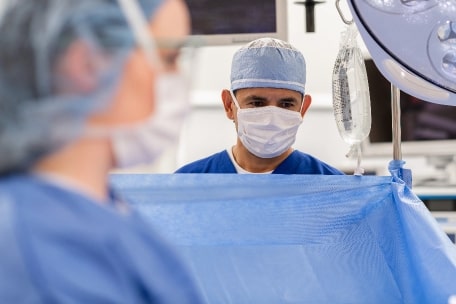
Anesthesiology
Your anesthesiology care will be provided by US Anesthesia Partners, the highest-quality, single-specialty anesthesia practice in the country. (Please note that you may receive a separate bill from US Anesthesia Partners.) Their top-tier anesthesiologists will help ensure a positive experience before, during and after your surgery.

Types of Anesthesia
General anesthesia is achieved through a combination of IV medications and/or gases you will breathe through a mask or breathing tube. General anesthesia provides a total loss of consciousness and pain control, so you will not be aware of sensation or pain during your procedure.
Regional anesthesia blocks pain to a specific area of your body. Your anesthesia clinician injects medication near a targeted nerve, cluster of nerves or the spinal cord. You may also receive medication to help you relax during your procedure. Two main types of regional anesthesia are:
- Peripheral nerve blocks: This type of block targets a specific nerve or group of nerves most commonly for procedures on hands, arms, feet, legs or face.
- Epidural or spinal anesthesia: This is an injection for nerves in the spinal canal that blocks pain for a large area of the body, such as the abdomen, hips or legs.
MAC (Monitored Anesthesia Care or Procedural/Conscious Sedation)
MAC involves I V medication to help you relax and reduce pain. You will not be completely “out” but can be very sleepy.
What You Didn’t Know About Anesthesia
Without anesthesia, many of modern medicine’s greatest benefits simply would not exist. That includes more than 35 million surgical procedures performed each year in the United States alone.
Today’s anesthesiologists practice one of the most complex disciplines of medical specialization. They command a vast amount of medical knowledge about:
- How the human body works and its responses to the stress of surgery
- Medications and how they act upon the body
- The sophisticated technology used to track every major organ system during surgery and to administer drugs in a variety of ways
During a major operation, anesthesiologists carefully choose the right equipment and medication dosages to fulfill a variety of functions, such as stopping pain, making the patient unconscious, and relaxing the body’s muscles. They constantly balance the needs of your unique medical situation, the requirements of the surgery, and your individual response to anesthesia.
Anesthesiologists also have improved techniques for turning off a patient’s response to pain in specific regions of the body. This means that patients may remain conscious and recover more quickly after certain surgical procedures.
Care Beyond Pain Relief
While anesthesiologists are primarily known for administering anesthesia and securing a patient’s airway during surgery, their role also includes:
- Pre-operative assessment – Anesthesiologists perform a thorough evaluation of your medical readiness for surgery. They manage and treat any medical problems arising before surgery.
- Post-surgery recovery – After your operation, anesthesiologists monitor your activity level, circulation, breathing, level of consciousness and oxygen saturation. They immediately diagnose and treat any medical problems arising during recovery, and they are involved in the provision of critical care medicine in the intensive care unit.
- Acute and chronic pain management – Anesthesiologists help relieve pain during surgery, as well as post-operatively through prescribing the most effective pain medications for your individual case.
During surgery, anesthesiologists play a crucial role in the surgery team. They monitor and manage your breathing, blood pressure, heart rate and rhythm, brain and kidney functions, body fluid balance, and body temperature. They also control your level of consciousness and pain to ensure a safe and productive surgery.
At the conclusion of surgery, anesthesiologists reverse the effects of the anesthetic medications, and return the patient to consciousness once again.
